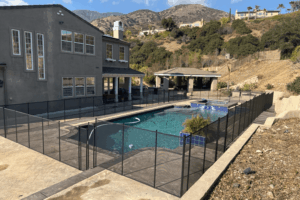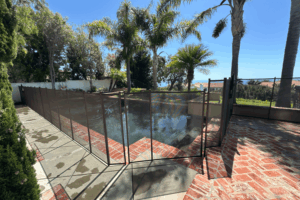
10 Questions to Ask Before Buying a Pool Safety Fence
Don’t buy a pool safety fence without asking these essential questions. This buyer’s guide helps you evaluate height, compliance, materials, installation, and more.
Home > 6 Tips to Prepare for Renting Out Your Home with a Pool

Pool rental properties can be a hot commodity in a crowded rental market, but as the owner, they come with some unique considerations. Home pool safety is something every pool owner should be familiar with, but when renting a property to a new family, you may find that their enthusiasm is far outpacing their experience level. In the end, that could mean big trouble for your pocketbook and tragedy for them. As the owner, it’s not just your responsibility to make sure you’re doing your part to create a safer property. It’s also a smart business move.
For many, coming home to a pool you can relax in, entertaining neighborhood friends and their kids around the water, and getting in your laps every day represent the ultimate American dream of having a home with a pool. With skyrocketing home prices, many families are finding a pool-equipped rental property to be a cost-effective path to their goal. This dream, unfortunately, can quickly turn into a nightmare when they find themselves unprepared for and uneducated about the costs, labor, and safety considerations that come with a backyard oasis. Thousands of lives are lost to accidental drownings annually, and the last thing you want is for your property to be the site of one of these tragedies, nor do you want your swimming pool to be damaged by carelessness.
Before listing your property with a pool as a rental, you need to take steps to reduce your liability risk, ensure your property is maintained, and protect your future tenants and their guests. Make no mistake. The extra care, preparation, and investments made into your property come at a cost, but prospective tenants will pay more for their American dream when they see the care you’ve put into improving home pool safety while you can rest easier knowing your financial health is protected.
Most pools on private property are governed by state laws that stipulate the pool safety features that are required to be in place, as well as pool construction standards. For pool rental properties, there may be additional guidelines. Local jurisdictions may have stricter regulations regarding not only your responsibilities but also annual permits or inspections. As you consider adding a property with a pool to your portfolio or before listing a property you already own, make sure you’re doing your research into the legal requirements on you as the landlord. Engaging a knowledgeable property attorney at this stage may cut into profits, but it pays off in the long run as you can make sure your legal responsibilities are met.
Home pool safety needs to be a focus. While you can’t monitor every decision the family you rent to makes when it comes to pool usage, you can start them off with the safest pool area possible. As you learned when investigating the laws your property falls under, this is more than just a service for your renters. Home pool safety laws govern the requirements for pool safety barriers in private homes and rentals with pools.
You already know the importance of carrying property and liability insurance on your home rentals, but a pool on the premises makes it even more important. With the increased risk of injury or drowning that comes from renting a home with a pool and the potential repair bill for damages, you’ll want to adjust your coverage to make sure you’re financially protected. Talk to your insurance agent about coverage options and make sure they understand the property and your protection needs as a landlord.
It takes time, money, and effort to keep your pool in good repair, and proper upkeep is not something renters are always reliable in providing. You’ll need to decide whether you want to risk having the residents coordinate professional care, do it themselves, or offer it as part of the rental package yourself. If your pool rental home is part of an HOA, pool upkeep may be provided as part of your membership fees, but otherwise, it may prove less hassle and risk, in the long run, to contract with a pool maintenance specialist, especially if you have multiple properties needing care.
As you can see, renting a home with a pool comes with a greater investment in money and resources than non-pool rentals. Get ready to invest your time as well. One of the best ways to protect both the property and yourself is to be hands-on with its supervision. Personally meet with new tenants, explain how their pool and safety equipment function, talk over your individual expectations and give them a written guide as a reminder. Inspect the pool area regularly for signs of damage or wear that may require repair.
A standard lease agreement is not usually sufficient for a home with a pool. Work with an experienced real estate attorney to craft a swimming pool addendum that lays out the specific responsibilities and rights of both parties as it relates to home pool safety, upkeep, and maintenance. Ensure you lay out your rights to inspection, incorporate your printed guide by reference, and stipulate when they should contact you about a pool issue or when they should instead be reaching out to an approved contractor. This addendum is a binding part of your legal contract, making it the best possible instruction manual for the care and usage of your pool rental and your best protection from liability.
Your local All-Safe Pool installer is ready to help you prepare your property to rent. They’ll schedule a time to inspect the pool area, take measurements, and give you a written estimate that lays out your cost-effective pool home safety options. Once you’re ready, they’ll get you into compliance so you can get your property rented. Get your free pool rental safety quote from your independent All-Safe Pool installation pro today.

Don’t buy a pool safety fence without asking these essential questions. This buyer’s guide helps you evaluate height, compliance, materials, installation, and more.

Understand how local pool fence codes work and what to check before installation. This beginner’s guide simplifies requirements so your safety barrier complies and protects effectively.

Learn the truth behind common pool safety myths and make better decisions to protect your family with fact‑based guidance on fences, barriers, and maintenance.
Enter your zip code to locate an independent installer in your area
Enter your zip code to locate an independent installer in your area

Due to the many variations in monitors, phones, and browsers, color samples and product examples may appear different on different screens. Computers and mobile devices are not all calibrated equally and color reproduction on the Internet is not precise. The same is true for printed items such as brochures and other sales literature.
In addition, the colors of our products photograph differently under different lighting conditions. For example, photos taken in full sunlight will vary from photos taken on a cloudy or overcast day. Similarly, shadows from nearby objects can affect the color and transparency of our products. If a precise color or specific shade is important, please inspect the actual color of your product prior to installation.
Many of our products’ materials are not available through typical stores and vendors and therefore must be custom manufactured specifically for our use. In order to control costs and provide you with the best value possible, our raw materials are produced in large batches and can often take several months to receive. The colors of our materials can, and often do, vary slightly from batch to batch. Although we make every effort to minimize color variations, we cannot be responsible for these differences when they occur. If a precise color or specific shade is important, please inspect the actual color of your product prior to installation.
For example, we use the name “putty” to describe some of our products. Your idea of the color “putty” may be different than someone else’s idea of “putty”. In addition, products may have the same color name but may not be the exact same color. For example, we have different shades of “black”. Please do not order using color names as your only guide. If a precise color or specific shade is important, please inspect the actual color of your product prior to installation.
If it is important that your product be an exact color or shade, it is highly recommended that you inspect the actual product prior to its installation and address any concerns with your local independent installer. Most independent installers do not offer refunds or accept returns due to color variations.